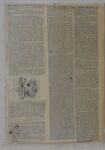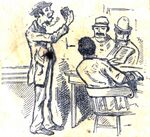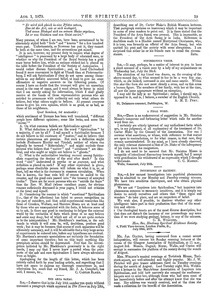HPB-SB-8-308: Difference between revisions
mNo edit summary |
mNo edit summary |
||
| Line 48: | Line 48: | ||
| item = 2 | | item = 2 | ||
| type = article | | type = article | ||
| status = | | status = proofread | ||
| continues = | | continues = | ||
| author = Zeta | | author = Zeta | ||
| Line 54: | Line 54: | ||
| subtitle = | | subtitle = | ||
| untitled = | | untitled = | ||
| source title = Spiritualist | | source title = London Spiritualist | ||
| source details = | | source details = No. 362, August 1, 1879, p. 59 | ||
| publication date = | | publication date = 1879-08-01 | ||
| original date = | | original date = | ||
| notes = | | notes = | ||
| Line 62: | Line 62: | ||
}} | }} | ||
... | {{Style S-Small capitals| Sir}},—I observe that in the July 18th number you quote without comment a paragraph which appeared ill' ''The Times ''on July 12th, describing one of Dr. Carter Blake’s British Museum lectures. That paragraph contains an inaccuracy which it may be important to some of your readers to point out. It is there stated that the President of the Arya Sama was present. This is impossible, as the President of the Arya Samaj is in India. Reference is doubtless made to a Hindoo named Hurrycund Chintamon, who, it is true, was formerly an official of the Arya Samaj, but who' quitted his post and the society with some abruptness. I am surprised that either he or his friends care to recall the circumstance. | ||
{{Style P-Signature in capitals| Zeta}}. | |||
{{HPB-SB-item | {{HPB-SB-item | ||
| Line 69: | Line 71: | ||
| item = 3 | | item = 3 | ||
| type = article | | type = article | ||
| status = | | status = proofread | ||
| continues = | | continues = | ||
| author = Massey C. C. | | author = Massey C. C. | ||
| Line 75: | Line 77: | ||
| subtitle = | | subtitle = | ||
| untitled = | | untitled = | ||
| source title = Spiritualist | | source title = London Spiritualist | ||
| source details = | | source details = No. 362, August 1, 1879, p. 59 | ||
| publication date = 1879- | | publication date = 1879-08-01 | ||
| original date = | | original date = 1879-07-26 | ||
| notes = | | notes = | ||
| categories = | | categories = | ||
}} | }} | ||
... | {{Style S-Small capitals| Sir}},—There is an undercurrent of suggestion in Mr. Stainton Moses’s temperate and forbearing letter which calls for another word from me. | ||
I certainly am utterly ignorant of any undisclosed facts which are, in my judgment, at all explanatory of the treatment of Dr. Carter Blake by the Council of the Association. Nor can I surmise what assertions, or whose, with reference to that matter are open to contradiction, or for what reason, in that case, they remain uncontradicted. To my mind, as I have already observed, the only relevant statement is that of Dr. Blake of the infrequency of his visits since his resignation. | |||
I do not need to be assured that Mr. Stainton Moses is incapable of intentional discourtesy towards myself, but I accept with gratification his withdrawal of an expression which I thought unfortunate. | |||
{{Style P-Signature in capitals| C.C. Massey}}. | |||
Wells, Somerset, July 26th. | |||
{{HPB-SB-item | {{HPB-SB-item | ||
| Line 107: | Line 117: | ||
{{HPB-SB-footer-footnotes}} | {{HPB-SB-footer-footnotes}} | ||
{{HPB-SB-footer-sources}} | |||
<gallery widths=300px heights=300px> | |||
london_spiritualist_n.362_1879-08-01.pdf|page=13|London Spiritualist, No. 362, August 1, 1879, p. 59 | |||
</gallery> | |||
Latest revision as of 08:18, 13 August 2024
 |
vol. title: Vol Four of The Theosophical Society of The Arya Samaj of Arya-wart vol. period: Sept 1878 – Sept 1879 pages in vol.: 350 |
< Sir,- I am thankful... (continued from page 8-307) >
entitled to pronounce with authority not only what others do believe, but what others ought to believe. At present everyone seems to give his own opinion, which is as good, or as bad, as those of his neighbours.
which sentiment of Terence has been well translated, “different people have different opinions; some like leeks, and some like ‘inions.’”
A. On what common beliefs arc Spiritualists agreed?
B. What definition is placed on the word “Spiritualism” by a majority, if not by all? I call myself a Spiritualist because I do not believe in the existence of “matter,” and do believe that certain phenomena arc genuine. But such a definition might include Professors Huxley and Tyndall, neither of whom can logically be termed “Materialists;” and might exclude those persons who believe that “matter” and “substance” are identical, and who might or might not believe in “ghosts.”
C. What is the authoritative teaching current among Spiritualists respecting the destiny of the soul after death? Is this word “soul” understood as psyche or as pneuma, and what definition is placed on each? If any other equivalent is given, perhaps some charitable person will inform me what it is, or, at least, tell me what is the currency in common circulation. When this is known, the base coin will of course be nailed to the counter, and the good coin passed into “the treasury of accepted truths.” There are far more persons who are “astride the fence” than the Rev. W. Miall (whose excellent paper, for obvious reasons sufficiently discussed in your pages, I could not criticise at the time) and myself.
D. Considering the manner in which “emotional” Spiritualism (i.e., that of the affections) has failed to secure recognition on the part of outsiders, and that solid experimental researches like those of Crookes, Wallace, and Stainton Moses are at least read by those who are unacquainted with the facts, it behoves some of us to ask, Is there any good in continuing to fatigue the external world by the recitation of facts which some of us may believe and some may deny, but of which not all of us are quite certain as to the interpretation? Mr. Blackburn’s machine, in the safe hands in which it will soon be, will, doubtless, produce good work; but it may be foreseen that scores of such apparatus will be ultimately necessary, and it will be advisable that a very large series of experiments be entered into, before any hypotheses are evolved. Mr. Harrison's accurate speculations are certainly the foundation of some important theories; but on this topic anything like precipitate action should be deprecated. Now that the investigation initiated by Mr. Blackburn’s generosity is in the right bauds, I may say that I never knew a period when the prospects of the safe and sure Spiritualism I have always advocated were so bright.
Apologising for the length of this letter, which has been entirely called forth by your leading article, and regretting that I have not space to express my thorough concurrence in, and admiration for, much that my friend, Mr. J. A. Campbell, has said, I remain, &c.,

The Arya Samaj
Sir,—I observe that in the July 18th number you quote without comment a paragraph which appeared ill' The Times on July 12th, describing one of Dr. Carter Blake’s British Museum lectures. That paragraph contains an inaccuracy which it may be important to some of your readers to point out. It is there stated that the President of the Arya Sama was present. This is impossible, as the President of the Arya Samaj is in India. Reference is doubtless made to a Hindoo named Hurrycund Chintamon, who, it is true, was formerly an official of the Arya Samaj, but who' quitted his post and the society with some abruptness. I am surprised that either he or his friends care to recall the circumstance.
A Final Word
Sir,—There is an undercurrent of suggestion in Mr. Stainton Moses’s temperate and forbearing letter which calls for another word from me.
I certainly am utterly ignorant of any undisclosed facts which are, in my judgment, at all explanatory of the treatment of Dr. Carter Blake by the Council of the Association. Nor can I surmise what assertions, or whose, with reference to that matter are open to contradiction, or for what reason, in that case, they remain uncontradicted. To my mind, as I have already observed, the only relevant statement is that of Dr. Blake of the infrequency of his visits since his resignation.
I do not need to be assured that Mr. Stainton Moses is incapable of intentional discourtesy towards myself, but I accept with gratification his withdrawal of an expression which I thought unfortunate.
Wells, Somerset, July 26th.
A Ghost in a Dress-Coat
...
Editor's notes
Sources
-
London Spiritualist, No. 362, August 1, 1879, p. 59

